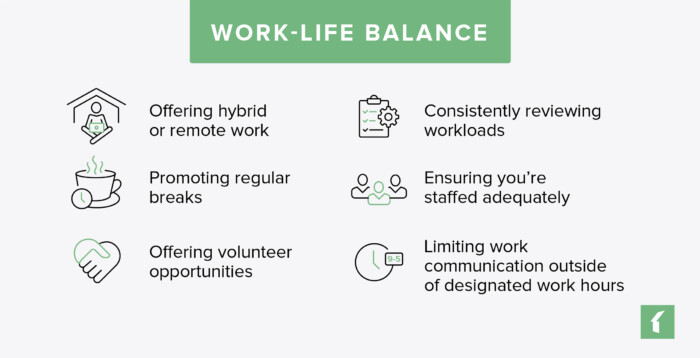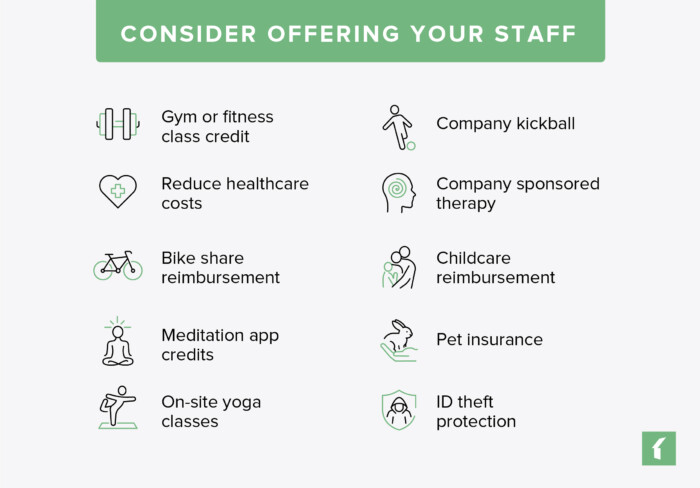While ping pong tables, unlimited snacks, and cold brew on tap are all amazing perks, they don’t define a strong company culture. That’s especially true at a time where keeping your employees engaged is becoming increasingly difficult, with shifting expectations around remote work and flexible schedules.
Ultimately, the property management business is about people, and that includes the people you hire. Dissatisfied employees are less productive, take more sick days, and are more likely to leave for new work opportunities elsewhere. According to Gallop, companies with engaged employees are 21% more profitable and 17% more productive. This has a knock-on effect of improving collaboration, and longer company tenures. In short, happy employees equal higher profit margins.
To keep your employees happy and retain your best talent, focus on building a positive company culture beyond the shiny toys. Here’s how.
The Core Pillars of a Positive Company Culture
The first step to building a great company culture is to audit where it is today. Combine your own analysis with employees and team members to gauge what’s working and what’s not. The best companies will admit to their shortcomings, while committing to realistic culture targets that improve the workplace environment for everyone.
Once you’ve got a good grasp of where you need to improve, here are a few actionable ways for you to achieve those goals.
Hire the Right People
Company culture is everyone’s responsibility. While leadership is responsible for setting clear company vision and ideals, the people you hire are key in ensuring the culture isn’t only maintained, but improved in the long run.
When hiring, prioritize employees with the kind of soft skills needed in property management. Those include collaboration, creative thinking, communication, conflict resolution, and leadership, and emotional intelligence (71% of employers value emotional intelligence more than technical skills when evaluating candidates).
Technology has increased collaboration at workplaces, which is why employee-to-employee interaction is increasingly important. And the property business is a people business – so invest in people with people skills.
Competitive Pay
Employees who feel they are paid fairly are much more likely to stay for longer periods of time, be motivated at work, and go above and beyond to help your company achieve your goals. As a result, competitive pay leads to lower turnover and higher morale.
Think of setting your employees’ pay as more of an investment than an expense. The cost of searching for, hiring, and training a new employee is not only financially costly, but resource-intensive as well.
Assess the current market demand for the skillset or level of expertise you wish to hire against the availability of the skillset or level of expertise. Tools such as the U.S. Bureau of Labor Statistics, Payscale®, Indeed®, and Salary.com® are all great resources to help with general benchmarking. Be sure to filter out base pay by years of relevant experience and location.
Employee Wellness
In a survey conducted by ADP, 31% of workers cited good work-life balance as their top criterion for staying at their job or searching for a new one, outweighing pay. Good work-life balance begins at the management level including:

On top of good management practices, you can offer programs that help your employees take care of their physical and mental health. This is another way to invest in your team by providing them with avenues to increase their energy, reduce stress, and lower health risks. Here are a few perks that you can consider offering your staff:

Transparency
Making your employees feel respected and valued in the workplace isn’t easy, but it’s one of the most rewarding aspects of working at a company. To feel appreciated and seen takes time, and it begins with transparent communication. Here are five actionable ways you can promote transparency and communicate more effectively in the workplace.
1. Clearly defined company values (and actions to drive them)
As a business owner, you get to decide what values your company represents. Decide on five to seven values that you want to integrate into your company culture, and put actions behind them. For example, if communication is a key value, then ensure you’re holding regular team meetings and open Q&A’s.
2. Acknowledge Special Occasions
A small but meaningful gesture you can incorporate is acknowledging birthdays and work anniversaries. Whether it’s a $20 Starbucks gift card, a birthday cake, or a company-wide Slack announcement, you can make their day a little extra special.
3. Internal Newsletters
Keeping everyone on the same page doesn’t have to involve long meetings. Sometimes a quick monthly newsletter is all it takes to keep everyone on the same page. Keep employees informed and make sure they feel like a part of the team. Here are a few other things you can include:
- Job postings
- Employee highlights
- Reminders for important company events
- Notes from leadership regarding the future of the company
- Birthdays
- Work anniversaries
- Polls or feedback
- Industry news or trends
4. One-on-One Time
Dedicate uninterrupted one-on-one time to get to know your employees as people, go over projects, openly discuss red flags or serious concerns, as well as acknowledging successes and new ideas. Whether it be a casual lunch or a walk around the office, make sure you set aside time to show that you have an ear to lend. Not only will your employees feel appreciated, but you will generate new ideas to improve company culture in a low-stakes environment.
5. Offer an Improvement Plan
Sometimes a new hire is just not the right fit, or a high-performing employee is hurting team morale. Offer them an opportunity to change their approach to work in a dignified way through a performance improvement plan (PIP) and open conversation. During this period, your employee can also take the time to see if the company is a good fit for them and prepare to move on if that’s the best path forward.
Tools to Help Improve Company Culture
Now that you’ve got a list of strategies to implement in your property management business, let’s talk about tools to help improve company culture without much additional effort.
Property Management Software
Property management software such as Buildium is one useful tool. The benefits of this kind of software goes beyond tenant and client-facing functions. It reduces the workload for your team, automates mundane, unfulfilling tasks, and gives you tools to communicate clearly and transparently. Plus, some of the time and resources you save from using property management software can be used to support company culture initiatives.
Equipping your staff with accounting, management automation, and marketing tools, for example, helps them to do every part of their job more efficiently . Business performance metrics and reports can be an excellent way to share ideas and discuss performance while communication tools make having those conversations easier, even if your employees aren’t all working under one roof.
Sales and CRM Software
If you were to leave for vacation, you need to ensure that your business is in good hands. Software such as LeadSimple can help you track the impact of your leave, or if a key employee leaves tomorrow, and its impact on your bottom line. Having the data and tools to measure business performance can ultimately help paint an objective picture of which employees need more support, training, or praise.
LeadSimple even integrates with Buildium, comprehensive property management software that makes everything from accounting to tenant outreach more efficient. This kind of purpose-built software can help you keep your company running with confidence, no matter what curveballs the changing job market—and notoriously hard to predict property management business—throws your way.
Read more on Team
